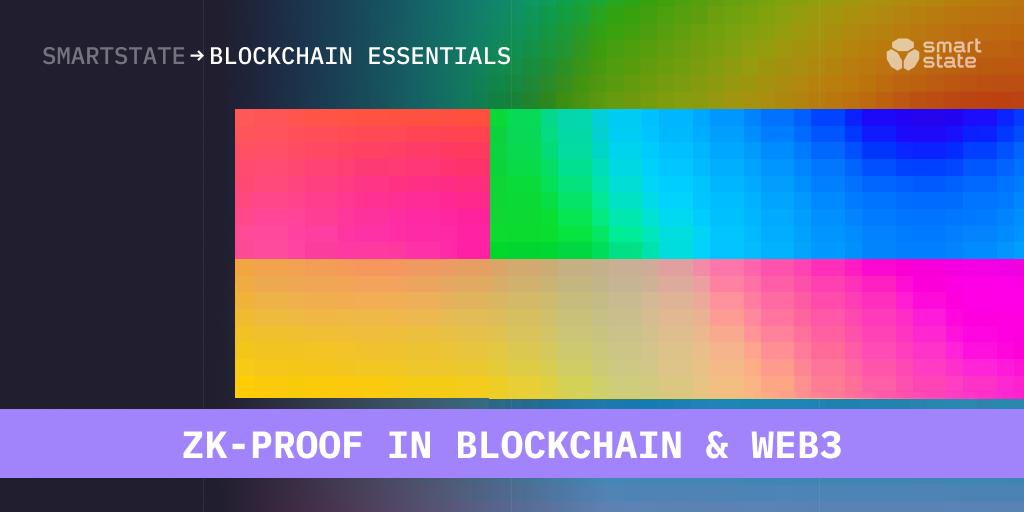Zero-knowledge proof in blockchain technology
Zero-knowledge proof (ZKP) is a type of math-based cryptography protocol or mechanism which allows to exchange data between parties without using passwords or any other contributory information. It is used by one of the parties involved in the transaction to verify the information is legit information without revealing anything else. Zero knowledge proof is considered one of the best and advanced solutions for achieving confidentiality.
There are three fundamental aspects to ZK-Proof. The first is the importance of transaction completeness. It means that the truth of the statement will convince the verifier about the proving person’s possession of the input in question.
The next point is soundness, which states that a dishonest prover is unable to convince the verifier about the possession of the required input, because the statement is false.
And last but not least is the ‘zero knowledge’ itself. The verifier won’t learn anything the prover is unwilling to disclose, no matter if the statement is true or false.
Types of ZKP
There are various types of ZTPs,the most notable being:
- Interactive (or IZKP) require the prover and the verifier to engage in a conversation, where the prover must respond to the verifier’s questions. The verifier has to confide in the prover to follow the protocol and trust that they provide honest responses.
- Non-interactive (or NIZKP). Unlike interactive, these don’t require a direct interaction between the parties. The prover needs only to create a self-contained proof which the verifier can verify independently, which is usually more convenient and efficient.
- zkSnark (zero knowledge-Succinct Non-Interactive Argument of Knowledge) uses a quadratic equation which helps to leverage public and private data and the inputs for generation proofs, after which the verifier validates the proof for a certain transaction completion. It can also serve as a choice for such tasks as proving the age of a person without revealing any personal information.
Advantages of ZKP
Using ZK-Proof has a number of advantages which makes it stand out, including:
- Simplicity. It does not require any complex encryption methods.
- Data security. ZKPs are directly associated with security, in particular because they help to avoid revealing any important information.
- Transaction shortening. Users do not need to worry about the information storage to provide for compatibility and identity of various assets.
- Privacy and scalability in one. The information is safe without compromising the access to various services that demand any data or identification. Privacy is one of the top priorities.
ZKP use cases
There are a number of ZKPs use cases on a blockchain. Its scalability ensures flexibility for the users along with the improved control and freedom concerning their information. Possible ZK-Proof use cases include:
- Messaging applications. End-to-encryption is one of the main requirements in the privacy-aiming world. Encryption of messaging ensures that strangers will be unable to read a private conversation. ZKP helps to develop end-to-end trust without revealing additional information to a third party.
- Authentication process. ZK-Proof provides a convenient platform for transmissions of sensitive data. It helps in the development of a secure channel so that the users can use their information without exposure and helps to decrease the risk of data leaks.
- File system control. ZKP is one of the tools for the advancement of file system control. It can add different layers of security to files, logins, etc. and makes it substantially hard to hack or manipulate the data stored in the system.
- Complex documentation procedures. ZKP helps to find reliable apps for complex documentation procedures and provides facilities for the encryption of data parts. Owing to this, users can get control over certain blocks to enable access for a certain user. On the other hand, it ensures restrictions of other users’ access. In other words, ZK-Proof ensures safeguards for complex documentation and restricts access for non-authorized users.
- Storage protection. ZKP helps to improve the efficiency of storage protection as it includes a protocol for security of a storage unit and the information it contains. Moreover, access channels also have strong safeguards which enable a secure and seamless experience.
- Sensitive information security. ZKP provides a high-end level of security for all blocks on the chain which may contain vulnerable banking information (e.g. financial data or transaction history). It allows to modify targeted blocks upon any information request, while all other blocks remain untouched.
- Private blockchain transaction transmission. Private transactions on a blockchain must be secured and protected from any third party. Thus, the use of ZKP helps to make private blockchain transactions resistant to various forms of attacks or interception.
- Vote verification. ZK-Proof is useful in digital voting, where the voters’ identities must be verified without breaking their anonymity. ZKP can also provide solutions for auditable voting by recording the votes on public blockchains. In this case the voting process does not require a third-party verification. ZK-Proof allows voters to prove their eligibility for voting without exposure of their sensitive data, and then voters may demand a proof for inclusion of their vote in a final tally.
- Shielded transactions. Zcash is a specific cryptocurrency which uses ZKP to enable shielded transactions, where sender’s and receiver’s addresses and transaction amounts are kept secret from the public blockchain, additional privacy.
- Tokenization and ownership verification. ZK-Proof is used for tokenization of assets and for verification of their ownership proofs. Some piece of property can be tokenized and its ownership can be later verified by anyone else without revealing any private information.

